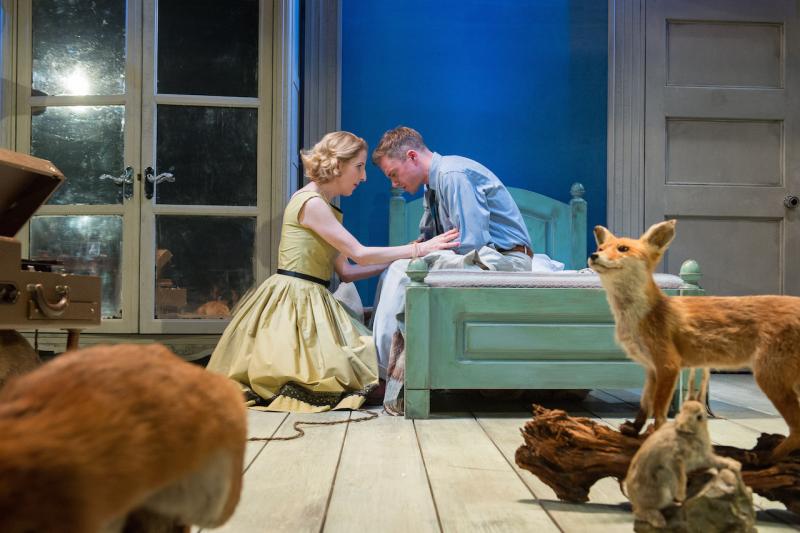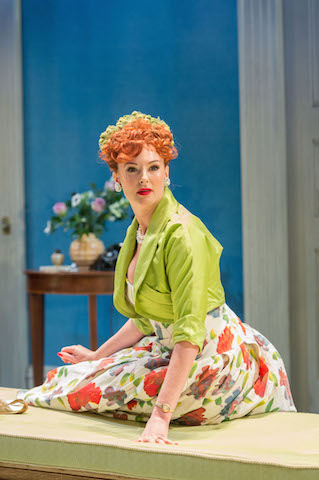Welcome Home, Captain Fox!, Donmar Warehouse | reviews, news & interviews
Welcome Home, Captain Fox!, Donmar Warehouse
Welcome Home, Captain Fox!, Donmar Warehouse
New comedy about a man who's lost his memory is a corker

It’s often remarked that are no new stories, only old stories retold. The French playwright Jean Anouihl got the idea for his first play from a French newspaper report of 1919, about a young man who turned up on a railway platform with no knowledge of who he was or how he came to be there. In the wake of the story’s publication, hundreds of bereaved families came forward to claim the unknown soldier as their own.
Now Anthony Weigh – an associate writer at the Donmar – offers his “new version” of Anouilh’s Le Voyageur sans bagage. It turns out to be a thorough rewrite, with added characters and in a different key, and it’s a corker. I’d put money on Welcome Home, Captain Fox! becoming a comedy classic.
 Weigh’s protagonist is also an ex-serviceman, but his war was the Second World War as an American pilot serving in Europe. Fifteen years have passed since he was reported missing, and we first meet him undergoing psychological tests in an Air Force sanitorium. He can remember what he had for breakfast that morning, but he’s stumped when asked what his favourite foods were as a child. Everything about him is a blank slate. He has no past.
Weigh’s protagonist is also an ex-serviceman, but his war was the Second World War as an American pilot serving in Europe. Fifteen years have passed since he was reported missing, and we first meet him undergoing psychological tests in an Air Force sanitorium. He can remember what he had for breakfast that morning, but he’s stumped when asked what his favourite foods were as a child. Everything about him is a blank slate. He has no past.
Is it the saving of him, or is it his tragedy that he becomes the pet project of New Jersey do-gooder Mrs Marcee Dupont-Dufort (Katherine Kingsley, pictured right)? That’s for both him and us to figure out in the course of the play. This self-hyphenated social climber (mountaineer is perhaps nearer the mark in Kingsley’s mesmerizing performance) has hit on the idea that if she can return this poor forgetful wretch to the bosom of a smart, old-money family in the Hamptons, it will give her an entrée to their world, beachside mansion, butler and all. Her dyspeptic husband (Danny Webb) sees through her game and tries to take her down at every turn, yet she is irrepressible.
If the Dupont-Duforts are ghastly, the Fox family are worse: chilly, snobbish, dysfunctional and permanently tanked on Martini. The prospect that “Gene” (Rory Keenan) might well be their long lost son/brother/brother-in-law Jack, puts them on their best behaviour for about five minutes, but soon they are back to sniping at one another. Each of them, we discover, has an old score to settle with Jack, and much of the play concerns his gradual discovery of the person Jack is, or was.
 In structure as well as period feel, Welcome Home, Captain Fox! bears some resemblance to Arthur Miller’s All My Sons. But where Miller’s play was all about peeling back layers of family lies, Weigh’s play is about building, piece by piece, a character who, for the protagonist, is a stranger. Ultimately, Gene/Jack can decide whether or not to own up to being Jack. And the sharp-clawed Foxes give him plenty of reasons not to.
In structure as well as period feel, Welcome Home, Captain Fox! bears some resemblance to Arthur Miller’s All My Sons. But where Miller’s play was all about peeling back layers of family lies, Weigh’s play is about building, piece by piece, a character who, for the protagonist, is a stranger. Ultimately, Gene/Jack can decide whether or not to own up to being Jack. And the sharp-clawed Foxes give him plenty of reasons not to.
Part of the joy of this play derives from its well-timed disclosures, scene by scene, from each character in turn. In this it finds an odd kinship with Agatha Christie. We even get an everyone-gathered-in-the-drawing-room final revelation. But there’s equal joy in Weigh’s fizzing comic writing and director Blanche McIntyre’s pacing of it (this is her debut at the Donmar and it’s impressive).
Sian Thomas is marvellous as the termagant Mrs Fox and Fenella Woolgar memorable as her ruthless and lascivious daughter-in-law. These two are the most consistent in their clipped East Coast vowels, contrasting nicely with the vulgar drawl of the Dupont-Duforts. Barnaby Kay (pictured above, with Rory Keenan) fills the thankless role of emasculated brother George with aplomb, and Michelle Asante makes a surprisingly rounded character of the sparky help, who won’t be put upon for much longer.
The other black character, James the butler, proves to be the moral centre of the play. The year is 1959, and the Civil Rights movement has just begun to stir. But either Trevor Laird underplayed him, or the part was underwritten. Alone of all the characters, we never know what the butler thought of Jack, and the omission feels like a fudge. Anthony Weigh might also think to address the odd linguistic slip, given the likely longevity of this hugely enjoyable piece. I am reliably informed that no American, making a choice, “plumps for” something. This critic, however, would plump for seeing the whole thing over again.
rating
Explore topics
Share this article
The future of Arts Journalism
You can stop theartsdesk.com closing!
We urgently need financing to survive. Our fundraising drive has thus far raised £49,000 but we need to reach £100,000 or we will be forced to close. Please contribute here: https://gofund.me/c3f6033d
And if you can forward this information to anyone who might assist, we’d be grateful.

Subscribe to theartsdesk.com
Thank you for continuing to read our work on theartsdesk.com. For unlimited access to every article in its entirety, including our archive of more than 15,000 pieces, we're asking for £5 per month or £40 per year. We feel it's a very good deal, and hope you do too.
To take a subscription now simply click here.
And if you're looking for that extra gift for a friend or family member, why not treat them to a theartsdesk.com gift subscription?
more Theatre
 Ragdoll, Jermyn Street Theatre review - compelling and emotionally truthful
Katherine Moar returns with a Patty Hearst-inspired follow up to her debut hit 'Farm Hall'
Ragdoll, Jermyn Street Theatre review - compelling and emotionally truthful
Katherine Moar returns with a Patty Hearst-inspired follow up to her debut hit 'Farm Hall'
 Troilus and Cressida, Globe Theatre review - a 'problem play' with added problems
Raucous and carnivalesque, but also ugly and incomprehensible
Troilus and Cressida, Globe Theatre review - a 'problem play' with added problems
Raucous and carnivalesque, but also ugly and incomprehensible
 Clarkston, Trafalgar Theatre review - two lads on a road to nowhere
Netflix star, Joe Locke, is the selling point of a production that needs one
Clarkston, Trafalgar Theatre review - two lads on a road to nowhere
Netflix star, Joe Locke, is the selling point of a production that needs one
 Ghost Stories, Peacock Theatre review - spirited staging but short on scares
Impressive spectacle saves an ageing show in an unsuitable venue
Ghost Stories, Peacock Theatre review - spirited staging but short on scares
Impressive spectacle saves an ageing show in an unsuitable venue
 Hamlet, National Theatre review - turning tragedy to comedy is no joke
Hiran Abeyeskera’s childlike prince falls flat in a mixed production
Hamlet, National Theatre review - turning tragedy to comedy is no joke
Hiran Abeyeskera’s childlike prince falls flat in a mixed production
 Rohtko, Barbican review - postmodern meditation on fake and authentic art is less than the sum of its parts
Łukasz Twarkowski's production dazzles without illuminating
Rohtko, Barbican review - postmodern meditation on fake and authentic art is less than the sum of its parts
Łukasz Twarkowski's production dazzles without illuminating
 Lee, Park Theatre review - Lee Krasner looks back on her life as an artist
Informative and interesting, the play's format limits its potential
Lee, Park Theatre review - Lee Krasner looks back on her life as an artist
Informative and interesting, the play's format limits its potential
 Measure for Measure, RSC, Stratford review - 'problem play' has no problem with relevance
Shakespeare, in this adaptation, is at his most perceptive
Measure for Measure, RSC, Stratford review - 'problem play' has no problem with relevance
Shakespeare, in this adaptation, is at his most perceptive
 The Importance of Being Earnest, Noël Coward Theatre review - dazzling and delightful queer fest
West End transfer of National Theatre hit stars Stephen Fry and Olly Alexander
The Importance of Being Earnest, Noël Coward Theatre review - dazzling and delightful queer fest
West End transfer of National Theatre hit stars Stephen Fry and Olly Alexander
 Get Down Tonight, Charing Cross Theatre review - glitz and hits from the 70s
If you love the songs of KC and the Sunshine Band, Please Do Go!
Get Down Tonight, Charing Cross Theatre review - glitz and hits from the 70s
If you love the songs of KC and the Sunshine Band, Please Do Go!
 Punch, Apollo Theatre review - powerful play about the strength of redemption
James Graham's play transfixes the audience at every stage
Punch, Apollo Theatre review - powerful play about the strength of redemption
James Graham's play transfixes the audience at every stage
 The Billionaire Inside Your Head, Hampstead Theatre review - a map of a man with OCD
Will Lord's promising debut burdens a fine cast with too much dialogue
The Billionaire Inside Your Head, Hampstead Theatre review - a map of a man with OCD
Will Lord's promising debut burdens a fine cast with too much dialogue

Add comment